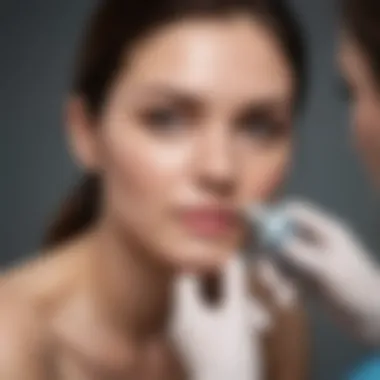Effective Methods for Eliminating Acne Scars and Achieving Clearer Skin


Fashion Trends
Dating Tips
Celebrity News
In the context of celebrity news, discussions on acne scars may seem distant from the glamorous world of red carpets and Hollywood updates. However, shedding light on how even celebrities deal with skincare challenges like acne scars can humanize their public personas. By examining how stars manage and treat acne scars, readers can gain insights into the various approaches to skincare and aesthetic treatments available today.
Inspiration and Style Tips
Understanding Acne Scars
Acne scars are a common dermatological issue that many individuals face. Understanding the nature of acne scars is crucial in addressing them effectively to achieve clearer and smoother skin. By delving into the different types of acne scars, causes behind their formation, and the effects they can have on skin texture and pigmentation, individuals can make informed decisions regarding their treatment and prevention strategies. Having a comprehensive understanding of acne scars is the cornerstone of developing a tailored approach to managing and eliminating these unwanted blemishes.
Types of Acne Scars
Atrophic Scars
Atrophic scars are a prevalent type of acne scar characterized by depressions or indentations in the skin. These scars result from a loss of collagen during the skin's healing process after inflammation from acne. The distinct feature of atrophic scars is their sunken appearance, which can lead to a visibly uneven skin texture. While challenging to treat, atrophic scars can be addressed through various dermatological procedures and skincare regimens, offering individuals options to improve the overall texture and appearance of their skin.
Hypertrophic Scars
Hypertrophic scars stand out due to their raised and thickened texture, forming as a result of excess collagen production during the skin's healing process. These scars are often firm to the touch and can be itchy or painful. Despite their prominence, hypertrophic scars can be effectively treated through techniques such as corticosteroid injections or laser therapy, helping to flatten the scar tissue and reduce their visibility.
Keloid Scars
Keloid scars are characterized by their overgrowth of scar tissue beyond the original site of the skin injury. These scars can be itchy, tender, and extend beyond the boundary of the initial wound. While keloid scars present a challenge in treatment due to their tendency to recur and grow back after removal, various medical options like cryotherapy or surgical excision can be employed to manage and minimize their appearance.
Causes of Acne Scars
Inflammatory Acne
Inflammatory acne, marked by red and swollen breakouts, is a significant contributor to the formation of acne scars. The inflammation and debris deep within the skin from these acne lesions can lead to permanent scarring if not treated promptly and effectively. Understanding the role of inflammatory acne in scar formation underscores the importance of early intervention and targeted treatment to prevent lasting skin damage.
Delayed or Inadequate Treatment
Delayed or inadequate treatment of active acne can pave the way for scar development. When acne is not appropriately managed or left untreated for prolonged periods, the likelihood of scarring increases. This emphasizes the importance of seeking professional dermatological care and adhering to recommended skincare regimens to address acne promptly and minimize the risk of scarring.
Genetic Predisposition


Genetic predisposition plays a significant role in an individual's susceptibility to developing acne scars. Some individuals may inherently have skin that is more prone to scarring due to genetic factors influencing collagen production and skin healing processes. Recognizing the impact of genetic predisposition on acne scarring can assist in tailoring treatment approaches and skincare regimens to suit individual skin needs.
Effects of Acne Scars
Psychological Impact
Acne scars can have a profound psychological impact on individuals, affecting self-esteem and confidence. The visible reminders of past acne breakouts may lead to feelings of self-consciousness and insecurity, impacting mental well-being. Addressing the psychological effects of acne scars is essential in comprehensive acne scar treatment, focusing not only on physical healing but also on emotional well-being.
Skin Texture Irregularities
Acne scars often manifest as skin texture irregularities, creating a bumpy or uneven skin surface. These irregularities can affect the smoothness and overall appearance of the skin, posing a cosmetic concern. By targeting treatments that address skin texture irregularities, such as microneedling or chemical peels, individuals can work towards achieving smoother and more even skin texture.
Hyperpigmentation
Hyperpigmentation, characterized by dark spots or patches on the skin, is a common effect of acne scarring. The discoloration left behind by acne lesions can persist long after the breakouts have healed, impacting the clarity and uniformity of the skin tone. Utilizing treatments like laser therapy or topical lightening agents can help fade hyperpigmentation, restoring a more even complexion and reducing the visible effects of acne scars.
Skincare Regimens for Acne Scars
Skincare regimens play a crucial role in addressing and preventing acne scars. By following a structured routine, individuals can effectively manage their skin condition and promote healing. Understanding the specific needs of acne-prone skin is essential when selecting products and treatments. Topical treatments form a cornerstone of skincare regimens for acne scars, offering targeted solutions to improve skin texture and tone.
Topical Treatments
Retinoids
Retinoids are derivatives of vitamin A, known for their ability to accelerate skin cell turnover and stimulate collagen production. These properties make retinoids a popular choice for treating acne scars, as they help improve skin texture and reduce hyperpigmentation. Despite their effectiveness, retinoids may cause skin sensitivity and require diligent sun protection.
Vitamin Serums
Vitamin C serums are antioxidant-rich formulations that help brighten the skin and reduce inflammation. They are valued for their ability to promote healing and protect the skin from environmental damage. Vitamin C serums can enhance collagen production, leading to firmer and smoother skin. However, they may oxidize quickly and lose potency over time.
Alpha Hydroxy Acids
Alpha hydroxy acids, such as glycolic acid and lactic acid, exfoliate the skin to improve texture and tone. These acids work by loosening dead skin cells and promoting cell turnover, which can reduce the appearance of acne scars. Incorporating alpha hydroxy acids into a skincare regimen can reveal brighter and more even-toned skin. Individuals with sensitive skin may experience irritation when using these acids.
Scar-Reducing Techniques
Microneedling
Microneedling involves the use of fine needles to create micro-injuries in the skin, stimulating collagen production and enhancing skin renewal. This technique can improve the appearance of acne scars by promoting tissue repair and regeneration. Microneedling is a minimally invasive procedure that may cause temporary redness and sensitivity.


Chemical Peels
Chemical peels utilize acidic solutions to exfoliate the skin and improve its texture. By removing damaged outer layers, chemical peels can fade acne scars and reveal fresher skin underneath. Different types of chemical peels offer varying levels of intensity, with deeper peels requiring longer recovery times and careful post-treatment care.
Laser Therapy
Laser therapy delivers focused energy to target specific areas of the skin, reducing the appearance of acne scars. Various laser technologies, such as fractionated lasers, can promote collagen production and skin rejuvenation. Laser therapy sessions may cause temporary discomfort and redness, with multiple treatments often recommended for optimal results.
Professional Treatments for Acne Scars
Professional treatments play a crucial role in addressing and resolving acne scars effectively. These advanced procedures, overseen by dermatological experts, offer targeted solutions to improve skin texture and appearance. By exploring various professional treatments for acne scars, individuals can access specialized care tailored to their specific needs and concerns. The benefits of professional treatments include customized treatment plans, advanced technologies, and professional guidance throughout the healing process. It is essential to consider factors such as the severity of scarring, skin sensitivity, and desired outcomes when choosing professional treatments for acne scars.
Dermatological Procedures
Microdermabrasion:
Microdermabrasion is a non-invasive procedure that exfoliates the skin, removing dead cells and promoting collagen production. This treatment enhances skin texture and reduces the appearance of acne scars by stimulating cell turnover. Its gentle yet effective nature makes it a popular choice for improving overall skin tone and clarity. Although microdermabrasion may cause mild redness or sensitivity initially, its long-term benefits in promoting smoother and more radiant skin make it a favorable option for individuals seeking non-invasive scar-reducing techniques.
Dermal Fillers:
Dermal fillers involve injecting substances to plump up depressed acne scars, creating a smoother skin surface. This technique is beneficial for addressing atrophic scars and restoring volume to sunken areas. Dermal fillers offer immediate results and a natural-looking outcome, making them a popular choice for individuals looking to diminish the visibility of acne scars quickly. However, issues like allergic reactions or temporary bruising are potential disadvantages to consider.
Fractional CO2 Laser:
Fractional CO2 laser therapy utilizes precise beams of light to target damaged skin cells, promoting collagen regeneration and skin rejuvenation. This advanced technology is effective in treating both superficial and deep acne scars, providing noticeable improvement in skin texture and tone. Although fractional CO2 laser treatments deliver significant results, they may involve downtime for skin recovery and post-treatment care to minimize potential side effects like redness or swelling. Overall, fractional CO2 laser therapy is a powerful option for individuals seeking a more aggressive approach to acne scar treatment.
Preventing Acne Scarring
In the realm of skincare, preventing acne scarring holds a paramount position. It serves as a crucial aspect in the pursuit of flawless skin, bringing not just aesthetic benefits but also psychological well-being. The significance of preventing acne scars lies in the long-term effects it has on one's skin texture and overall confidence. By incorporating effective preventive measures, individuals can avoid the distressing aftermath of acne outbreaks, ensuring a smoother and clearer complexion over time. Through proper guidance and adherence to preventive strategies, individuals can proactively combat the development of acne scars, fostering a healthier and more resilient skin barrier.
Effective Acne Management
- Timely Treatment of Acne: Timely treatment of acne emerges as a cornerstone in the management of skin health. This proactive approach addresses acne outbreaks swiftly, minimizing the chances of scarring. The prompt initiation of treatment reduces inflammation, prevents bacterial proliferation, and accelerates the healing process. Timely intervention not only curbs the severity of acne but also mitigates the potential for scarring, offering a proactive solution that aligns with the theme of this article.
- Avoiding Picking or Squeezing Pimples: One key aspect of effective acne management involves refraining from picking or squeezing pimples. Such practices can exacerbate inflammation, rupture the follicle walls, and escalate the risk of scarring. By exercising restraint and adopting hands-off strategies, individuals can prevent further damage to their skin, contributing significantly to the overall goal of acne scar prevention.
- Balanced Diet and Hydration: Maintaining a balanced diet and adequate hydration positively impacts acne management. A diet rich in essential nutrients and hydration helps fortify the skin from within, enhancing its resilience against acne and potential scarring. Providing the skin with the necessary nourishment and hydration promotes overall skin health, aiding in the prevention of acne scarring.
Proper Skincare Practices
- Gentle Cleansing: Gentle cleansing plays a pivotal role in skincare routines, especially for individuals prone to acne. This practice involves using mild cleansers that effectively remove impurities without stripping the skin of its natural oils. Gentle cleansing contributes to maintaining skin integrity, preventing breakouts, and minimizing the risk of scarring. Its non-abrasive nature aligns well with the objectives of this article, promoting a gentle yet effective approach to skincare.
- Non-Comedogenic Products: Opting for non-comedogenic products is crucial in proper skincare practices, particularly for acne-prone skin. These products are formulated to avoid clogging pores, reducing the chances of acne development and subsequent scarring. By choosing non-comedogenic options, individuals prioritize skin health and prevent potential triggers for acne scars, making it a strategic choice in comprehensive skincare routines.
- Sun Protection: Sun protection stands as a fundamental component in skincare regimens, playing a pivotal role in preventing skin damage and scarring. Shielding the skin from harmful UV rays through sunscreen application or protective clothing reduces the risk of hyperpigmentation and other sun-induced skin issues. Prioritizing sun protection aligns with the overarching goal of preventing acne scarring, emphasizing the importance of safeguarding skin health against external aggressors.
Consultation with Dermatologists


- Regular Skin Check-ups: Regular skin check-ups under the guidance of dermatologists offer proactive monitoring of skin health. These appointments enable early detection of any potential skin issues, including acne development, allowing for timely intervention and prevention of scarring. By engaging in regular skin assessments, individuals can stay ahead of any impending skin concerns, fostering a preventive approach supported by professional expertise.
- Tailored Treatment Plans: Tailored treatment plans curated by dermatologists cater to individual skin needs, addressing specific concerns such as acne and scar prevention. These customized plans encompass targeted strategies and interventions to combat acne, mitigate scarring risks, and promote skin rejuvenation. By opting for personalized treatment regimens, individuals receive comprehensive care that aligns with the objectives of this article, underscoring the importance of strategic and tailored approaches to skincare.
- Professional Advice: Seeking professional advice from dermatologists offers valuable insights and recommendations for effective acne management and scar prevention. Dermatologists provide expert guidance on suitable skincare routines, product selections, and treatment modalities tailored to each individual's skin type and condition. This professional input not only enhances the efficacy of acne management but also empowers individuals to make informed decisions about their skin health, reinforcing a proactive stance against acne scarring.
Lifestyle Adjustments for Acne Scarring
In the realm of combating acne scars, lifestyle adjustments play a pivotal role in the overall journey towards clear and smooth skin. These adjustments encompass a range of habits and practices that can significantly impact the skin's health and vitality. By incorporating specific elements tailored to address acne scarring, individuals can enhance the effectiveness of their skincare routines and professional treatments. Lifestyle adjustments offer a holistic approach to skincare, considering internal and external factors that influence skin health.
Stress Management
Mindfulness Techniques
Mindfulness techniques serve as a cornerstone in stress management practices when addressing acne scarring. The concept revolves around being present in the moment, cultivating self-awareness, and reducing anxiety levels. Mindfulness techniques aid individuals in coping with the emotional toll of dealing with skin imperfections, promoting a positive mindset and overall well-being. By integrating mindfulness into their daily routine, individuals can enhance their resilience to stress triggers, fostering an environment conducive to skin healing.
Exercise Routine
Integrating an exercise routine into one's lifestyle is highly beneficial for those grappling with acne scarring. Regular physical activity boosts circulation, promotes skin cell regeneration, and helps in stress reduction. The increase in blood flow to the skin during exercise facilitates the delivery of essential nutrients and oxygen, aiding in skin repair and rejuvenation. Moreover, exercise releases endorphins, the body's natural stress relievers, contributing to overall skin health.
Adequate Rest
Adequate rest is crucial in the journey towards addressing acne scarring effectively. During sleep, the body undergoes repair and regeneration processes, including skin cell renewal. Lack of sleep can lead to increased levels of stress hormones, exacerbating acne breakouts and hindering the healing of acne scars. Prioritizing quality sleep ensures optimal skin recovery and promotes a rejuvenated complexion.
Healthy Habits
Hydration
Hydration is a key element in maintaining skin health and addressing acne scarring. Adequate water consumption ensures proper skin hydration, aids in detoxification, and promotes skin elasticity. Hydrated skin is more resilient to external aggressors, reducing the likelihood of further skin damage. Including hydrating beverages and foods in the diet can enhance the skin's natural barrier function and support the process of scar reduction.
Nutritious Diet
A nutritious diet plays a critical role in promoting skin healing and regeneration. Incorporating a variety of fruits, vegetables, lean proteins, and healthy fats provides essential nutrients for skin health. Vitamins, minerals, and antioxidants obtained from a balanced diet support collagen production, skin repair, and scar fading. Eating a nutrient-rich diet nourishes the skin from within, contributing to a smoother complexion.
Regular Exercise
Regular exercise complements skincare routines by promoting overall wellness and skin vitality. Physical activity enhances blood circulation, delivers oxygen and nutrients to the skin cells, and removes toxins through sweat. Engaging in consistent exercise boosts skin health, reduces inflammation, and supports the body's natural detoxification processes. Exercise also aids in stress reduction, which is essential for preventing acne breakouts and minimizing the appearance of scars.
Avoiding Harmful Practices
Overexposure to UV Rays
Protecting the skin from overexposure to UV rays is paramount in preventing further skin damage and exacerbation of acne scars. UV radiation can worsen hyperpigmentation, cause premature aging, and increase the risk of skin cancer. Using sunscreen with adequate sun protection factor (SPF), seeking shade during peak sunlight hours, and wearing protective clothing are crucial in maintaining skin health and preventing prolonged sun damage.
Smoking Cessation
Smoking cessation is essential for individuals aiming to improve their skin quality and combat acne scarring. Smoking tobacco leads to the constriction of blood vessels, reducing blood flow to the skin and depriving it of essential nutrients. The toxins in cigarette smoke also damage collagen and elastin fibers, contributing to skin sagging, wrinkles, and delayed wound healing. Quitting smoking supports skin repair processes, rejuvenation, and overall skin health.
Avoiding Harsh Chemicals
In skincare routines, avoiding harsh chemicals is imperative for individuals with acne scars. Harsh ingredients in skincare products can strip the skin of its natural oils, disrupt the skin barrier, and exacerbate inflammation. Opting for gentle, non-irritating products formulated for sensitive skin minimizes the risk of adverse reactions and supports the skin's healing process. Choosing products free from fragrances, alcohol, and synthetic dyes reduces the likelihood of skin irritation and promotes a healthier skin barrier.



